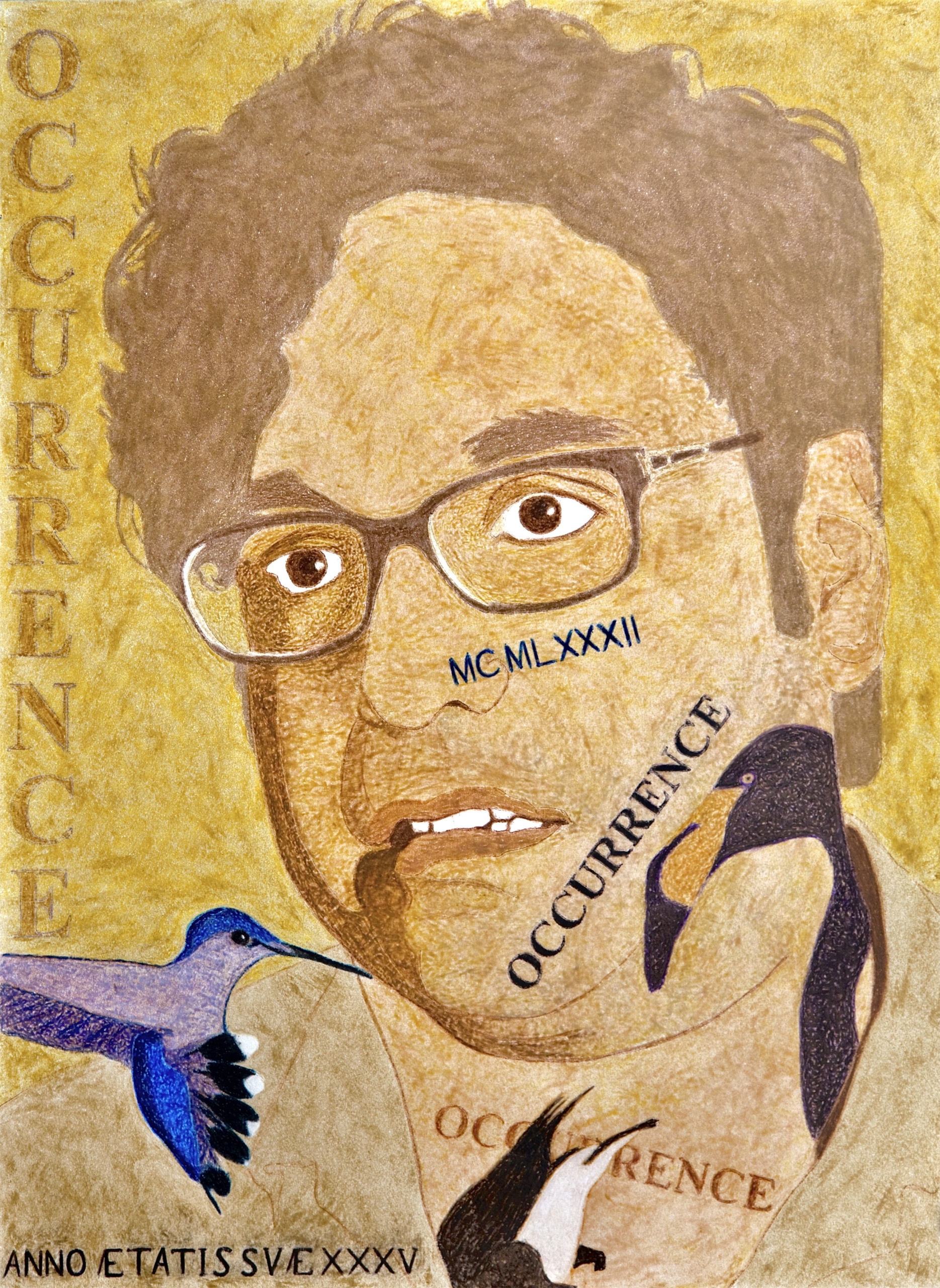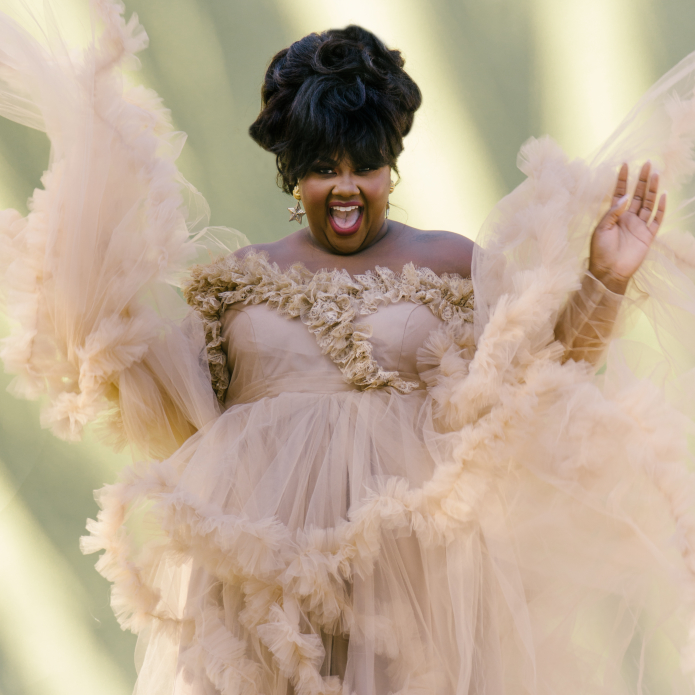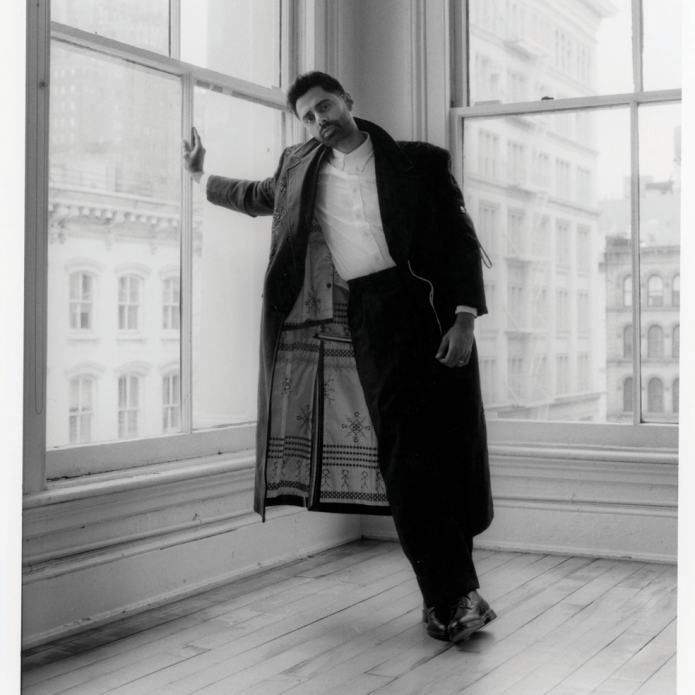
I met Hari Kondabolu exactly how I meet most people these days, through Zoom. To describe his current state, he reminded me of the film They Live, in which the protagonist finds sunglasses that allow him to see that the world is in fact populated with aliens and coded messages hiding in plain sight—except the sunglasses we put on reveal white supremacists instead. That’s certainly the kind of humor I know Kondabolu for. He doesn’t shy away from hard content, but he still wants the laugh. His comedy isn’t about racism—it’s about living a life in which you can’t avoid it. He isn’t trying to assert a specific identity, only to live and be as honest as he can with himself. While stand-up may not be his current avenue of expression, he’s been hard at work on a number of other projects. For one, he’s a new father. On top of that, he’s restarted the sharp and funny podcast Politically Re-Active with his friend, comedian W. Kamau Bell. And he’s been writing with his best friend—his brother. It was a pleasure speaking to him about comedy, television, culture and integrity, and what to do when you’re really stuck.
Ajay Kurian: I’m happy to talk to a South Asian creative, especially someone as politically motivated as you. There’s a moment in your comedy special Warn Your Relatives that really spoke to me, where you say, “Oppression is pain. And when you tell someone, ‘We’ve come a long way,’ you are really telling them to hold on to their pain longer.” First off, that sentiment is beautifully put, but also the individual and structure coincide in that moment. Holding pain individually is seen as part of a longer process of understanding the structure of why what I’m holding exists. Despite Instagram’s obvious flaws, I also see a lot of critical content that is its own education, and it makes me hopeful when kids post and share this stuff. They are getting such an incredible education so much sooner than I did. They are aware of these structures at a much earlier age.
Hari Kondabolu: It’s what makes me hopeful. Malala, Greta Thunberg, the Parkland kids. Charlottesville started with a young Black woman who organized to get those statues removed. All the young people of color who walked out of school as a part of Black Lives Matter. There is a point where you realize that these kids are not anomalies. That’s not to question how amazing they are, but they are part of this larger trend. One reason for it is access to the internet and their education, even if it is an informal one. Kids are always asking “why” and, in the past, their only limitation was their parents and teachers; but now, with the internet, they actually get multiple whys and they get to choose which reason they actually agree with. It’s also about realizing that adults don’t have all the answers, which was a painful discovery I had to have later. The idea of my child looking up to me now... He’s a few Google searches away from realizing I don’t know shit.
When I started doing stand-up there were people who liked my stuff but it felt very outside of the mainstream—not to say that everyone understands the stuff I’m saying now—but it certainly feels kind of surreal to see the stuff that I’ve cared about for a while be all over the place. Kids are talking about it; it’s being written about and broadcasted. Maybe it’s because people are out of work right now and we are in the middle of a pandemic; whatever the reason, people are out there, they are marching and aggressive, and I love it.
AK: I’ve wondered whether there was an increase in white allyship because their own bodily precarity finally came to the forefront in a massive, structural way.
HK: Wow, I didn’t even think about that—the idea that me walking outside could have implications. The difference, of course, being that someone could harm me unknowingly by giving me COVID. I’m sorry, part of me is just so excited to be having an intellectually stimulating conversation.
AK: Your comedy tends to have an intellectual bent. Maybe you are going to get a bit ruffled, but do you consider yourself an educator?
HK: You know it’s really tricky. When I started to want to talk about things with meaning it was probably after 9/11, so when I was 19, 20, 21—all of a sudden I am questioning what I’m doing, and certainly the choice to talk about certain things at the time was deliberate. There was an educational aspect but I hadn’t quite figured it out yet: how to write jokes about the stuff I was passionate about. I knew how to mention it or rant. When I moved to Seattle in 2005, I was doing comedy at night and working on immigrant rights organizing during the day. I definitely had the ability to express my politics through words. I think when I got there I started to figure out how I could also do this with humor, how I could make jokes with hard material and ideas. There were moments where I was didactic and even condescending and that didn’t help. I had to actively teach myself that my job was to make people laugh. That’s the difference between a guy ranting on stage and a com. Of course, some people laugh at the face value, which is always a risk when you are using satire.
AK: Which reminds me of the reason Chappelle left his show—because he started to feel like he was getting the wrong kind of laughs.
HK: Exactly—what you need is enough information; you need to educate them enough, and not for the purpose of their future or the conversation they are going to have after the show, but enough to understand the punchline because the subject matter is stuff I want to talk about. I want to talk about John Brown, not because I want to teach people about John Brown, but because he’s fascinating. That’s what I had to come to terms with. I’m not up there to educate. I’m up there to be the truest version of me and the truest version of me is interested in all these things that I need to explain to people so that we’re on the same page. When I have audiences I don’t need to explain as much to, it’s more fun. I can get to level two. The Apu documentary [The Problem with Apu] was a level-one documentary. No South Asian said, “Thank you I learned so much.” They said, “Thank you for putting that out there.” The documentary is more educational and is built to be like that. With stand-up, I want to see that as art.
AK: To me, when it comes to art, it’s all about observation. Even if you are making the most conceptual “out-there” work, it’s because you have observed something in the world and you are creating something out of it. The better and closer the observation, the more interesting the work is, and if you can really give that life, it can be great art. It can be funny and do all these other things incidentally, but it’s because you are working with this incisive observation.
HK: I think that’s also why people who are marginalized often end up making the most interesting art—because you are closest to the most painful and dangerous things in society. That’s not to say that all marginalized people make great art, but when you look at the history of comedy, whether it’s Richard Pryor or Paul Mooney, if you go through the list of top-ten comics, a good portion of them are Black or Jewish, and I don’t think it happens to be that way incidentally. If humor is a defense mechanism—if that’s the evolutionary advantage for keeping it around—then the people who are using it the most are the ones who are closer to pain and danger. And the material they produce is even more shocking because it catches people off guard when you talk about painful things and it makes them laugh. I think it might be marginalized people’s greatest resource.
AK: You know I was recently watching your interview with bell hooks...
HK: (Laughing) How surreal is that?
AK: Very. Like the moment in the interview when you are making the case for the structure of a joke—even one with terrible and sexist content, and how it can be good from a formal perspective—and she says no. I am paraphrasing, but basically you were trying to find a balance of saying something funny and not being preachy, and the way she put it was that “it’s a matter of integrity.”
HK: When people say, “That’s not funny, it’s racist,” it is a misunderstanding of how art works and why something is dangerous. Most people are not that critical when it comes to consuming art. They don’t think: “What did I just eat?” They think: “This tastes good.” That’s why I disagree with what bell hooks said. I see it as an issue of the master’s tools. When I see a joke and I say, “Wow, that is really well-written,” what I’m also saying is, “I’m learning from that particular method.” And as much as I may hate that joke, or the person who said it, there is a skill that person has learned that I need to learn, too. But what I do with that is going to be different.
I’m going to use Hinduism as an example. And I’m not sure if you grew up Hindu or not, but it’s something that is ever-present, so first let me just say: fuck the Hindu Right.
AK: I’ll make sure that’s in print.
HK: Haha, good, although I’ll never be able to visit family again. But yeah, in Hinduism there are these demons called the rakshasi. Unlike Christian demons, they pray, and their prayers get answered too. That’s actually what many of the epics in the Hindu tradition are about—how demons use the gifts they’re awarded by the gods to ruin the world, and therefore they must be stopped. Humans and demons receive the same gifts; they just use them differently.
That’s how I think you have to view art. The Birth of a Nation by D. W. Griffith is one of the most racist films of all time, but it is also one of the most important, because of its editing techniques. But if you just focus on those techniques, you are missing the point. The film is about how the white race needs to get their power back. It’s incredibly racist but you can also learn cinematically how he was able to manipulate people.
Are you telling me that learning from other people’s mistakes is wrong? I agree with bell hooks that our goal should be to be righteous, but how we get to be righteous is not necessarily independent of the tools.
AK: This also makes me think of when you interviewed Dana Gould; there is a moment when he asks, “What’s funnier?” as if it’s a simple, unbiased question. I had two reactions to that. On the one hand, you are going after the laugh—there is an end point in comedy. On the other hand, I feel like Donald Glover’s career is a good way to interrogate the question of what’s funny. In looking at what’s funny you also see something about culture. Donald Glover starts on 30 Rock, which is an incredible show and groundbreaking in so many ways, but a lot of things don’t hold up—especially its relationship to Blackness. Donald Glover as a writer is marginalized to the character of Toofer, which is fucking insane to me. Then he’s on Community and has more of a voice. There are two Black characters on the show, and you get the sense that whiteness is a thing and that there is a different kind of funny that can happen. And then comes Atlanta. Atlanta could never have happened during the time of 30 Rock because the audience is so different and the idea of what’s funny is too. As culture changes, so does what we think is funny—it’s not all timeless.
HK: With Donald Glover, I would start with his pre-30 Rock work like Derrick Comedy because you can see both the seeds of some of the writing he did for 30 Rock out of necessity, as well as his early stand-up, but also the kind of structural thinking and flipping things on their head that you see in Atlanta. You see he has the tools for both, but he was the only writer of color in that group, so it’s more a question of what he was allowed to do. And again, that’s what pained me about making my 101 documentary; it’s like, “This is what I’m allowed to do right now.”
For example, when Fresh Off the Boat came out, it was not Eddie Huang’s story at all. ABC took a seed and ran with it, and Eddie was really upset. Part of me is like, “You have the right to be upset,” and at the same time, “You don’t, because you sold it to ABC, not HBO or FX.” ABC was making the mainstream Asian American show that should’ve been made 15 years earlier. They were catching up. They suppressed our voices for so long that everything we experienced when we were 12 is interesting to them. We were the Asian kid nobody talked to. It’s kind of like those motherfuckers who made fun of Indian food, and then in college were like, “I dig this stuff,” after saying it smelled funny for years.
I think a little bit about Mindy Kaling and folks who were from that first wave. She took a lot of crap from the community. “How come you’re not representing us? How come you aren’t telling our stories?” And I’m like, “Don’t you think it’s fucking confusing to actively find a way to make your dreams work in a world that doesn’t want to hear your complete experience and then you fucking make it work anyway.” I understand what the community wanted from her, but we are obviously five steps ahead of everyone else. When Never Have I Ever came out, which was a huge push forward, you have to remember that show could never have happened when Mindy got started, but not because she didn’t want to make it.
It’s weird when you walk around and people see you as your culture instead of as a human being that is moving within multiple cultures constantly, because that is what all of us do. I don’t walk around saying, “I’m Indian, I’m Hindu.” Nobody does.
AK: It’s almost like—just give us a minute to breathe so we don’t have to spend every second proving our humanity to you. Let us be a person with you.
HK: Think about how insulting it is that, for years, these complex South Asian characters couldn’t be on screen, nor could really any people of color. You couldn’t be one of the main characters. God forbid both the mom and dad are people of color. God forbid there isn’t a white partner to play the role of the audience. The question was always “How are white mainstream American audiences going to relate to this?” And meanwhile, how do people of color relate to everything? We look at it from your perspective and connect it to our experiences because we only get your perspective and we constantly need to translate it. If we didn’t, we wouldn’t be able to enjoy anything. Anyway, they are trying now. The idealistic reason is that we come from a generation that’s exposed to more things, but also the more cynical and perhaps more realistic reason is that they found out we have money, too. I feel very conflicted about it as a person working within that framework. It’s certainly capitalism that has driven a lot of this forward.
AK: I could talk to you all day but you are working with a baby, so maybe I’ll close this for now, with where you are creatively.
HK: I’ve been moving away from stand-up a little bit, which would have been harder to do without the influence of the pandemic, because even though there have been times when I’ve been burned out and unhealthy as a result of it, when you don’t know any other way to express yourself, when you’re almost addicted to that adrenaline rush, it’s really hard to stop. But I can’t do it now. I’m unwilling to tour because I have a family and I don’t want to put them at risk. It’s made me a fuller creative person. Imagine you’ve done this one job your whole life and all of a sudden you have to learn a new job and, with creative fields, that often means multiple new jobs.
It makes me think about this thing my mom said for years and I never wanted to listen to: You can always write. Whatever happens, writing never stops. It never stops at any age. And I feel that more now than ever. It’s the one thing that I have that I’m apparently decent enough at that I can even venture into new areas. It also makes me think of something Chris Rock said to me: “Every career slump I ever had, I’ve written myself out of.” That’s not to say I’m in a career slump, but it’s that kind of faith that’s so important—that you have something innately in you that got you this far and that if you keep doing, and you don’t stop doing for whatever reason, you’ll get yourself out.




